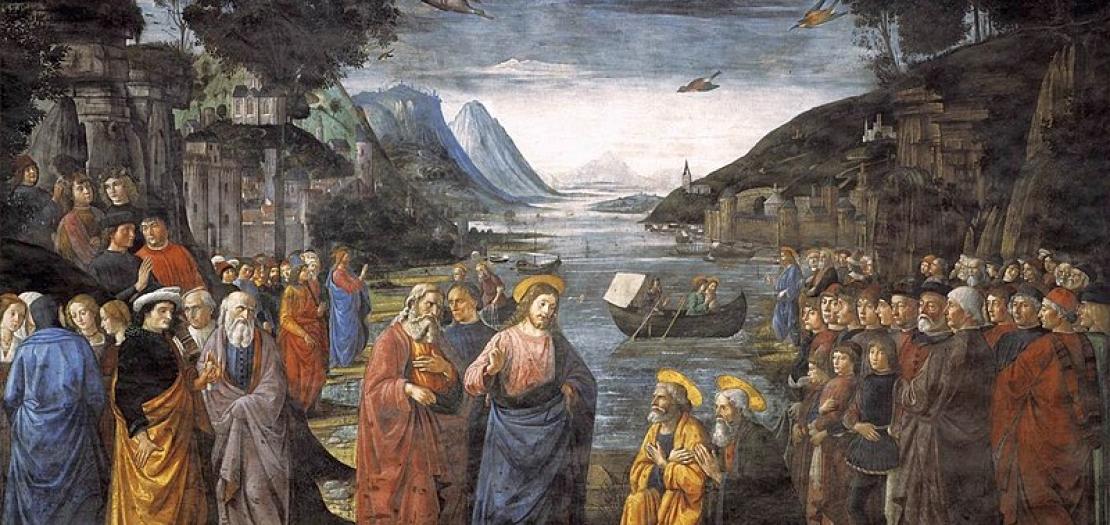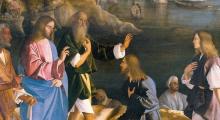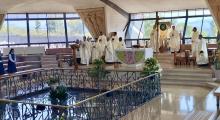Issued by the Catholic Center for Studies and Media - Jordan. Editor-in-chief Fr. Rif'at Bader - موقع أبونا abouna.org

Following is the text of meditation by Cardinal Pierbattista Pizzaballa, Latin Patriarch of Jerusalem: The 16th Sunday of ordinary time, dated July 21, 2024:
In last Sunday’s Gospel, (Mark 6:7-13) we learned of the Lord’s disciples’ mission: to meet the world in their pain.
It is not about waiting for those who suffer to come and knock on the Church’s door, but about seeking them out, joining them, and sharing in their pain.
The disciples were sent out by their Master. They did not take many tools or develop specific strategies. They left empty-handed, and because of this, they experienced the weaknesses and pains that affect human life.
Thus, to heal this soul illness, there is only one remedy: to become a person who is welcoming and hospitable to others so they can unburden themselves without fear.
Today's passage (Mark 6:30-34) informs us that the Lord Jesus especially cares for those called to this mission.
Upon the disciple's return, He offers them a period of rest and rejuvenation, comprising two distinct events.
The first event (Mark 6:30) is indispensable: The disciples return to the Lord, gather around Him, and share everything they have experienced with Him.
It is an essential moment because it concerns the very identity of the disciples and, therefore, the Church of any era.
Indeed, the Church is not primarily a group of people who look after others and do good to them. Instead, they gather around the Lord to draw and share life with everyone.
Without a constant return to the source, there is a risk of becoming self-absorbed, no longer bringing the Lord’s salvation but that of self.
It would become a fruitless mission.
Gathered around the Lord, the disciples share their experiences and recount what they have witnessed. This is a fundamental step of faith, as it involves reflecting on lived experiences in the context of the Word, allowing the teachings of the Lord Jesus to illuminate their experiences with the light of Easter.
Alongside this moment, to which Jesus dedicates all the necessary time, there is a second one, which, on the other hand, seems to encounter some hindrances: Jesus, in fact, invites his own to withdraw to a deserted area to rest for a while (Mk. 6:31), but this does not happen, because so many people, sensing their intentions, precede them and wait for them in the place where they were headed to find some rest.
What does this mean?
For Jesus, taking time to rest is a good thing: He himself invites the disciples to do so.
However, today's Gospel shows us what kind of rest can be genuinely restorative to our lives.
In fact, we might think that rest consists in getting rid of our problems and those of people, as if it were possible to take a break from life and enter an interlude, in which we drop everything that distresses us.
For Jesus, true rest is not found in this. Instead, it lies in rediscovering the significance of our choices and the profound unity of our existence, as only in this way can we truly find rest.
Jesus reveals a unifying and peace-giving element at the end of today’s Gospel. When getting out of the boat, he sees the crowds looking for him and has compassion on them. (Mark. 6:34) "This way of living involves being present in the heat of the moment without avoiding its complexities, and not shying away from the pain of our brothers and sisters, but rather embracing it as our own. This is what brings true peace and rest in life."
True rest is closely connected to compassion and love, not to the absence of work and toil.
Living life while trying to spare oneself eventually empties one of their very existence and achieves the opposite effect from the desired one: it leaves one sad and tired.
On the contrary, loving others without limits does not take away energy but instead multiplies it and brings existence to its fullness.
+Pierbattist







